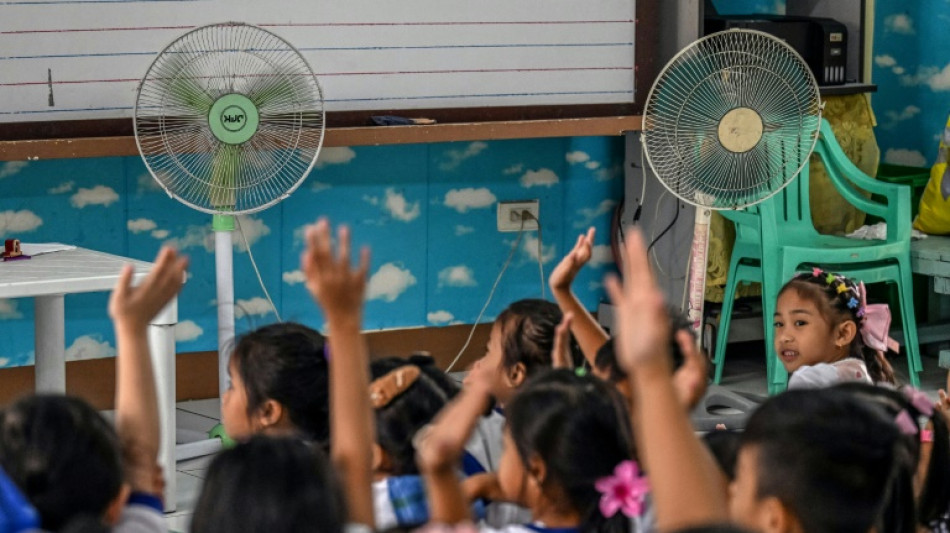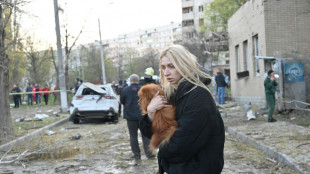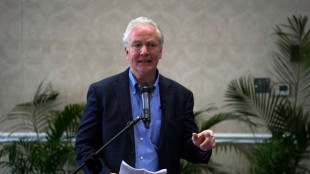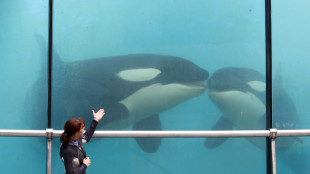
-
 Maresca confident he will survive Chelsea slump
Maresca confident he will survive Chelsea slump
-
Mob beats to death man from persecuted Pakistan minority

-
 Lebanon says one killed in Israeli strike near Sidon
Lebanon says one killed in Israeli strike near Sidon
-
Arsenal's Havertz could return for Champions League final

-
 US officials split on Ukraine truce prospects
US officials split on Ukraine truce prospects
-
Client brain-dead after Paris cryotherapy session goes wrong

-
 Flick demands answers from La Liga for 'joke' schedule
Flick demands answers from La Liga for 'joke' schedule
-
'Maddest game' sums up Man Utd career for Maguire

-
 Trial opens for students, journalists over Istanbul protests
Trial opens for students, journalists over Istanbul protests
-
Gaza rescuers say Israeli strikes kill 24 after Hamas rejects truce proposal

-
 'Really stuck': Ukraine's EU accession drive stumbles
'Really stuck': Ukraine's EU accession drive stumbles
-
'Not the time to discuss future', says Alonso amid Real Madrid links

-
 74 killed in deadliest US attack on Yemen, Huthis say
74 killed in deadliest US attack on Yemen, Huthis say
-
Southgate's ex-assistant Holland fired by Japan's Yokohama

-
 Vance meets Meloni in Rome before Easter at the Vatican
Vance meets Meloni in Rome before Easter at the Vatican
-
Ryan Gosling to star in new 'Star Wars' film

-
 Hamas calls for pressure to end Israel's aid block on Gaza
Hamas calls for pressure to end Israel's aid block on Gaza
-
Russia says Ukraine energy truce over, US mulls peace talks exit

-
 58 killed in deadliest US strike on Yemen, Huthis say
58 killed in deadliest US strike on Yemen, Huthis say
-
Museums rethink how the Holocaust should be shown

-
 Three dead after deadly spring storm wreaks havoc in the Alps
Three dead after deadly spring storm wreaks havoc in the Alps
-
No need for big changes at Liverpool, says Slot

-
 Bloody Philippine passion play sees final performance of veteran 'Jesus'
Bloody Philippine passion play sees final performance of veteran 'Jesus'
-
New US envoy prays, delivers Trump 'peace' message at Western Wall

-
 Postecoglou sticking around 'a little longer' as Spurs show fight in Frankfurt
Postecoglou sticking around 'a little longer' as Spurs show fight in Frankfurt
-
US threatens to withdraw from Ukraine talks if no progress

-
 Tears and defiance in Sumy as Russia batters Ukraine border city
Tears and defiance in Sumy as Russia batters Ukraine border city
-
Russia rains missiles on Ukraine as US mulls ending truce efforts

-
 Tokyo leads gains in most Asian markets on trade deal hopes
Tokyo leads gains in most Asian markets on trade deal hopes
-
Two missing after deadly spring snowstorm wreaks havoc in the Alps

-
 'War has taken everything': AFP reporter returns home to Khartoum
'War has taken everything': AFP reporter returns home to Khartoum
-
US strikes on Yemen fuel port kill 38, Huthis say

-
 Slegers targets Lyon scalp in pursuit of Arsenal European glory
Slegers targets Lyon scalp in pursuit of Arsenal European glory
-
'Defend ourselves': Refugee girls in Kenya find strength in taekwondo

-
 China's manufacturing backbone feels Trump trade war pinch
China's manufacturing backbone feels Trump trade war pinch
-
Sri Lankans throng to Kandy for rare display of Buddhist relic

-
 Chinese vent anger at Trump's trade war with memes, mockery
Chinese vent anger at Trump's trade war with memes, mockery
-
Heartbroken Brits abandon pets as living costs bite

-
 Mongolian LGBTQ youth fight for recognition through music, comedy
Mongolian LGBTQ youth fight for recognition through music, comedy
-
Cash crunch leaves Syrians queueing for hours to collect salaries

-
 Lyon left to regroup for Champions League bid after painful European exit
Lyon left to regroup for Champions League bid after painful European exit
-
Unravelling Real Madrid face Athletic Bilbao Liga test

-
 Napoli disturbing buoyant Inter's peace in Serie A Easter bonanza
Napoli disturbing buoyant Inter's peace in Serie A Easter bonanza
-
Disappointed Dortmund chase consistency with Europe at stake

-
 Asian markets mixed as traders track tariff talks
Asian markets mixed as traders track tariff talks
-
Yan and Buhai share lead at LA Championship

-
 Under fire at debate, Canada PM Carney tries to focus on Trump
Under fire at debate, Canada PM Carney tries to focus on Trump
-
Liverpool poised for Premier League coronation, Leicester, Ipswich for relegation

-
 India's elephant warning system tackles deadly conflict
India's elephant warning system tackles deadly conflict
-
US senator meets wrongfully deported Salvadoran migrant


Early holiday, more fans: Philippines schools adapt to climate change
Kindergarten teacher Lolita Akim fires up five standing fans with three more at the ready as she fights to hold the attention of her pint-sized pupils in Manila's soaring heat.
Last year, heatwaves forced millions of children in the Philippines out of school. It was the first time that soaring temperatures had caused widespread class suspensions, prompting a series of changes.
This school year started two months earlier than usual, so the term ends before peak heat in May. Classes have been rearranged to keep children out of the midday heat, and schools are equipped with fans and water stations.
The moves are examples of how countries are adapting to the higher temperatures caused by climate change, often with limited resources.
As a teacher, Akim is on the frontlines of the battle to keep her young charges safe and engaged.
"In this weather, they get drenched in sweat; they become uneasy and stand up often. Getting them to pay attention is more difficult," she said of the five-year-olds in her care at the Senator Benigno S. Aquino Elementary School.
Some six million students lost up to two weeks' worth of classroom learning last year as temperatures hit a record 38.8 degrees Celsius (101.4 degrees Fahrenheit), according to the education department.
Schools reported cases of heat exhaustion, nose bleeds and hospitalisations as students struggled through lessons in classrooms without air conditioning.
Scientists say that extreme heat is a clear marker of climate change, caused largely by burning fossil fuels like coal, oil and gas.
Last year's heat was further exacerbated by the seasonal El Nino phenomenon.
But even this year, nearly half Manila's schools were forced to close for two days in March when the heat index -- a measure of temperature and humidity -- hit "danger" levels.
"We've been reporting (the heat index) since 2011, but it's only been recently that it's become exceptionally warm," national weather service specialist Wilmer Agustin told AFP, attributing it to "El Nino and climate change".
This year, conditions in most of the country will range between "extreme caution" and "danger" on the government's heat alert system, he said, "especially in April and May".
On Friday, scores of schools in Manila were shuttered as temperatures were expected to hit 34C, while the national weather service said the heat index for at least five provinces would hit the danger level.
- 'Significant' impact -
During last year's closures, alternative learning helped make up some of the gap.
But "the overall impact on students' education was significant", said Jocelyn Andaya, assistant education secretary for operations.
So this year, a series of measures have been instated to avoid further learning loss.
Classroom sessions have been shortened to four hours a day -- avoiding the searing midday sun -- and water stations were installed in each classroom as well as at least two oscillating wall fans.
Some newer schools have heat-reflective roofs, and bigger ones now employ nurses.
Just three percent of students affected by last year's heatwaves were able to access online classes, so this year printed material was prepared for students if they must stay home.
Even so, Benigno Aquino school principal Noel Gelua cautioned that "there is no real alternative to face-to-face learning."
But there are limits to what can be done, given the education department has a budget of just 10 billion pesos ($174 million) for climate adaptation, infrastructure and disaster readiness.
The Philippines also has a perennial classroom shortage, with 18,000 more needed in the capital alone.
Manila's public schools do two shifts per day, with about 50 students in each 63 square-metre (678 square-foot) room, exacerbating the heat problem.
Fifth-grader Ella Azumi Araza, 11, can only attend four days a week due to the shortage.
On Fridays, she studies in her family's nine-square-metre cinderblock home on a bed she shares with her younger brother, who suffers from epilepsy.
Three electric fans are always on in the windowless, single-room structure.
As hot as it is at home, her mother Cindella Manabat still frets about conditions at school, saying that she comes home coughing.
"I make her carry a jug of water to prevent dehydration," she said.
- 'Difficult to teach' -
Across the street from Benigno Aquino, eighth-graders at President Corazon C. Aquino High School aimed tiny, rechargeable fans at their bodies while taking an algebra quiz.
Two of the four ceiling fans in the room had given out and the remaining two were clearly not enough for the 40 students.
"It is very difficult to teach in the heat," their teacher Rizzadel Manzano said.
"Motivating them is really a challenge."
A school uniform requirement was ditched earlier this year, and students now wear sweatpants and T-shirts donated by the city, principal Reynora Laurenciano told AFP.
Both schools are located in a densely populated slum area called Baseco, where conditions at home can be even more dire, she added.
"If you ask them, they consider (school) a safer place," Laurenciano said.
S.Leonhard--VB




